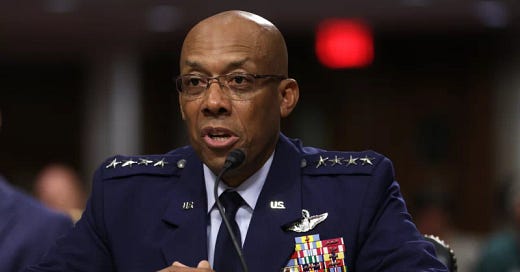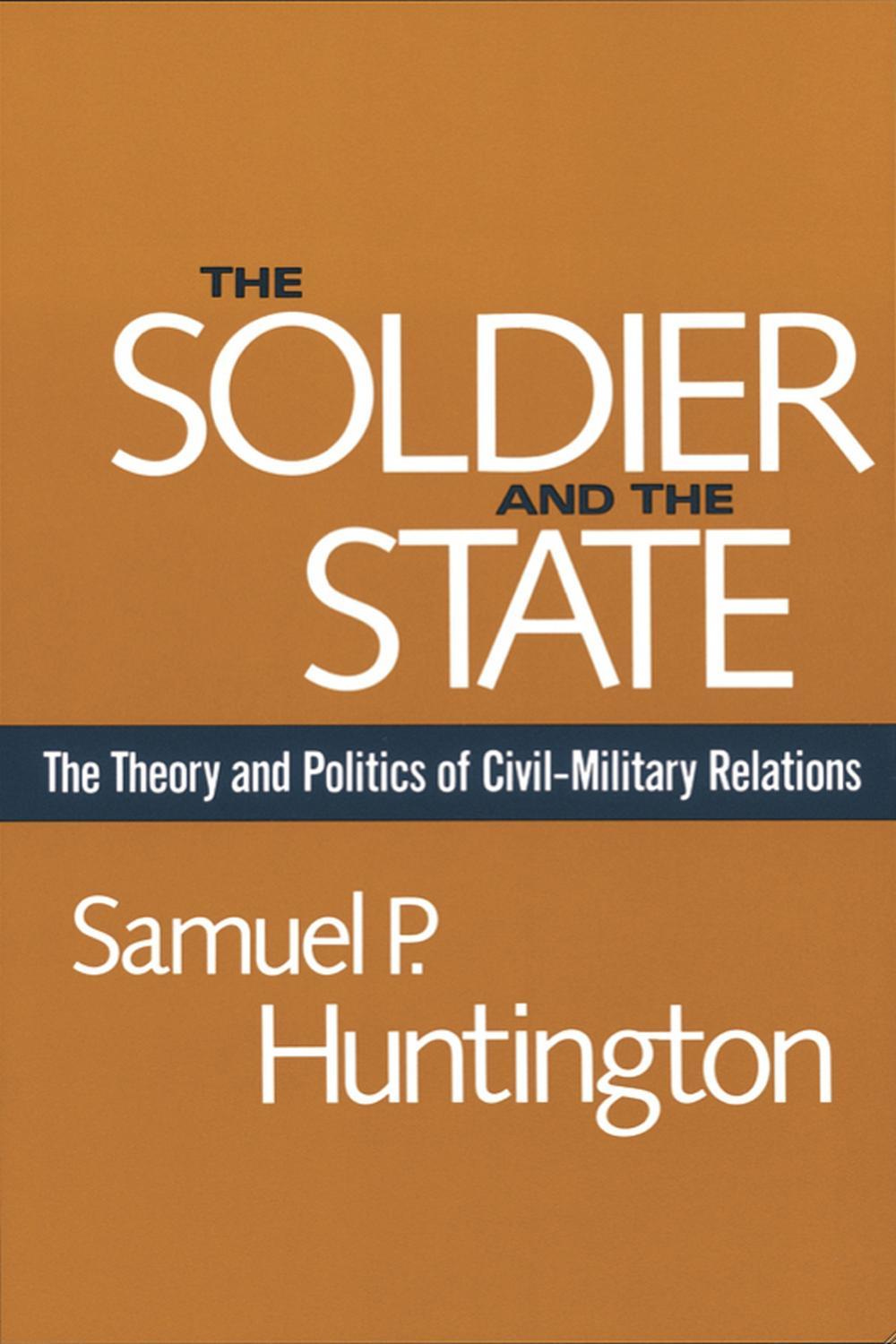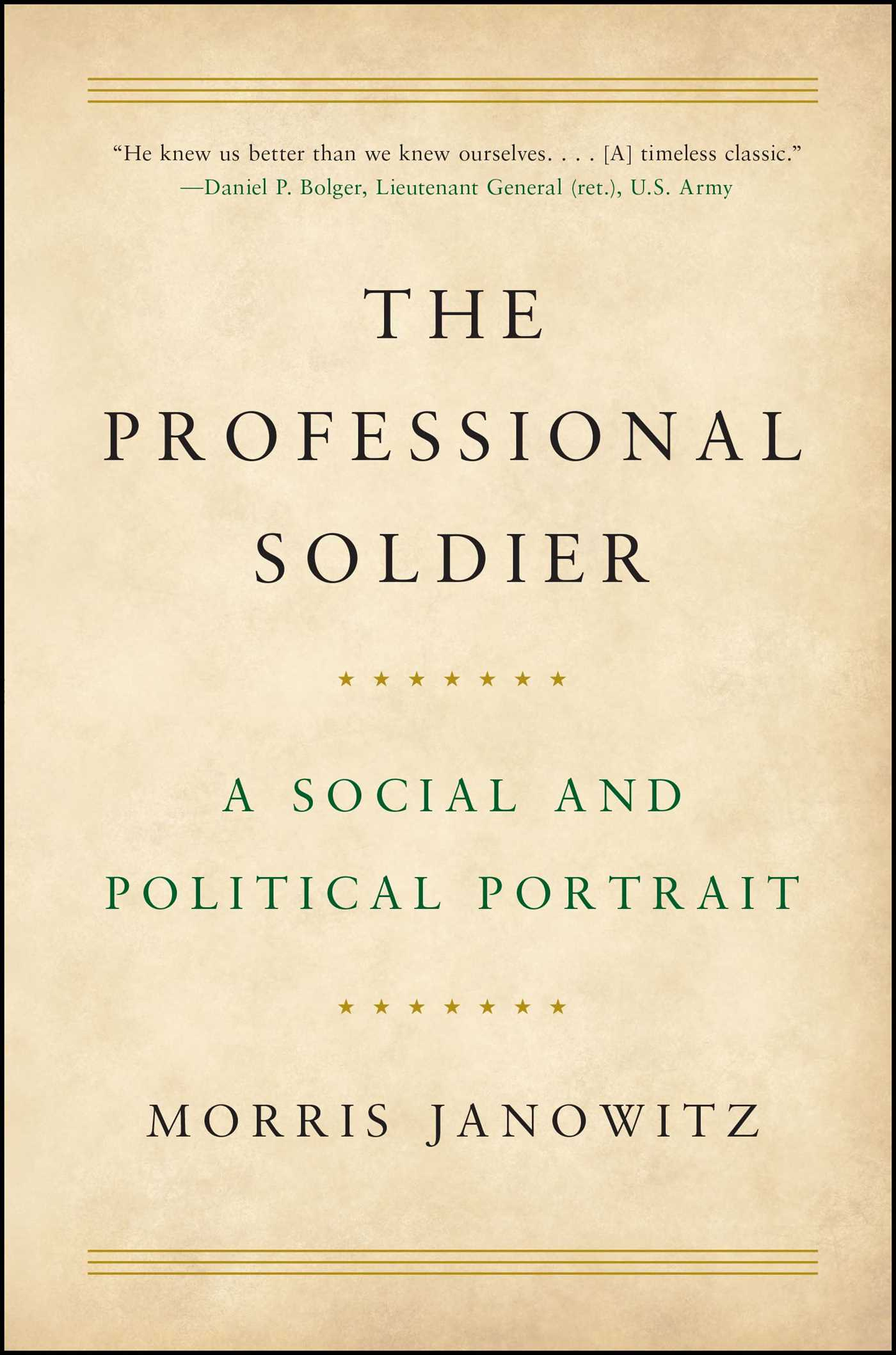A (Scary) New Era of American-Civil Military Relations
The Death of "Objective Control" and "Dual Loyalty"
In a Friday Night news dump, President Trump initiated a significant overhaul of the U.S. military's top leadership by dismissing several high-ranking officials, including General Charles Q. Brown Jr., the Chairman of the Joint Chiefs of Staff.1 General Brown, who had served as the nation's highest-ranking military officer since October 2023. The reshuffling did not stop with his dismissal. Admiral Lisa Franchetti, the Chief of Naval Operations, and General James Slife, the Air Force Vice Chief of Staff, were also relieved of their duties. Moreover, all of the top lawyers (JAG’s) were let go as well.
In a swift succession, President Trump announced his intention to nominate retired Air Force Lieutenant General Dan "Razin" Caine as General Brown's successor. Lt. Gen. Caine, a three-star general who previously served as the CIA's associate director of military affairs, is recognized for his instrumental role in dismantling ISIS. However, his appointment is unconventional, given his retired status and the leap from a three-star to a four-star position, pending Senate confirmation. There were no announcements regarding who would be replacing other officials who were fired.
Civil-Military relations can be defined as the practices, interactions, and relationships between elected civilian authorities, and leaders of the military institutions of the nation. In democracies, civilian control over the military is a fundamental principle, ensuring that the military serves the interests and policies of the civilian government and the nation it represents. the founder proposed a centralized defense of the country with mechanisms in place to mobilize and demobilize troops to meet the needs of the nation.2 The Constitution is explicit in expressing civilian control of the military in Article II Section 2 declaring that, “the President shall be Commander in Chief of the Army and Navy of the United States, and of the Militia of the several States, when called into the actual Service of the United States.”3 Congress was given the responsibility of declaring war and managing the budget of the military to serve as a check on the president.
The Founding Fathers laid a foundation for civilian control over the military because they were deeply skeptical of a professional military, believing that it created more potential for government abuse. As Richard Kohn explains, “The point of civilian control is to make security subordinate to the larger purposes of a nation, rather than the other way around. The purpose of the military is to defend society, not to define it.”4 But there is an inherent contradiction between a democratically elected government built around compromise and debate and a military built around hierarchy and following orders.
Scholarship on civil-military relations in the United States can be traced to Samuel Huntington’s The Soldier and the State, which attempted to articulate the challenges in the aftermath of World War II, when for the first time, the United States was managing a large peacetime military with global commitments while also trying to maintain liberal democratic values.5 The Soldier and the State has been a mainstay in professional military education for nearly five decades since its publication. Maj. Gen. William Rapp, a former commandant of West Point and the U.S. Army War College, wrote that “Huntington’s 1957 The Soldier and the State has defined civil-military relations for generations of military professionals. Soldiers have been raised on Huntingtonian logic and the separation of spheres of influence since their time as junior lieutenants.”6
Huntington’s views on the role of the military can be summarized as objective control, professionalism, specialization, autonomy, and ethics. His central argument, which became most associated with him, was a call for “objective control” of the military.7 He argued that civilian control over the military should be maintained, but it should be based on a clear understanding of the distinct roles and expertise of both civilians and military professionals.8 In his view, the military should be responsible for the technical aspects of warfare, while civilian authorities should make policy decisions.9 This division, in his view, would ensure the military's expertise in matters of national defense. Huntington argued that the officer corps should have a degree of autonomy in determining military policy and strategy within the boundaries set by civilian authorities. This autonomy was seen as essential to maintaining professionalism and expertise within the military. Finally, Huntington believed in the importance of a distinct professional ethic within the military, based on loyalty to the Constitution, subordination of the military to civilian authority, and a focus on the military's technical competence.10
Morris Janowitz built on Huntington’s work in his book, The Professional Soldier, published three years after The Soldier and the State, drawing on many of the challenges the military faced amidst a changing profession in the aftermath of World War II.11 Janowitz’s writing endorsed many of Huntington’s core points including the professionalization of the military as a means of strengthening civilian control over the armed forces. He believed that a professional military, characterized by a well-trained and educated officer corps, would be more likely to respect and adhere to civilian authority. His perspective was shaped by his work as a sociologist, focusing on societal integration, dual loyalty, the role of the military in social change, and civic education.
Unlike Huntington, Janowitz emphasized the importance of integrating the military into society.12 He believed that the military should reflect that of the broader society it serves, with military personnel and their families participating in civilian life. This integration would help bridge the gap between the military and civilian sectors, making the armed forces more accountable to society. Janowitz explored the idea of “dual loyalty,” which refers to the soldier’s moral obligations both to the military and broader society.13 He suggested that in democratic societies, it was essential for the military to prioritize loyalty to the democratically elected civilian leadership. Janowitz also examined the role of the military in social and political change. He argued that the military could act as a catalyst for social change by promoting certain values and behaviors within the organization and, by extension, in society at large. Janowitz believed that the military should engage in civic education and instill democratic values and principles in its members. This would not only help maintain civilian control but also contribute to a broader sense of citizenship and responsibility among military personnel. Janowitz's work was particularly influential during the Cold War era and contributed to a deeper understanding of how the military should function in democratic societies, balancing the need for a strong defense with the principles of civilian control and social integration.
There are two distinct perspectives or schools of thought when it comes to American civil-military relations. One is “professional supremacists,” and the other is “civilian supremacists.” There are different terms for these perspectives, and some scholars have been highly critical of the term “professional supremacists” coined by Dr. Peter Feaver.14 Eliot Cohen, a professor of strategic studies at Johns Hopkins, coined the idea of “Civilian Supremacy,” which characterized civilian control as absolute with no room for interpretation from the military, in his book Supreme Command.15 His perspective on civil-military relations has often been used as a competing model to Huntington’s model of “professional supremacy” or “objective control” depending on what term one prefers.16 Nonetheless, these terms provide an essential conceptual tool and are used throughout the field.
Professional supremacists argue that the recurring problem for civil-military relations, specifically in wartime, is ensuring the military an adequate voice and keeping civilians from micromanaging and mismanaging matters.17 The other camp argues that the central problem is ensuring that civilian guidance is followed even when the military disagrees with that direction.18 There is an additional principle advocated by civilian supremacists, which is that because civilians have ultimate control over the use of the military, they “have a right to be wrong.”19 As Feaver puts it, “The military can describe in some detail the nature of the threat posed by a particular enemy, but only the civilian can decide whether to feel threatened and so how or even whether to respond. The military quantifies the risk, the civilian judges it.”20 Therefore from civilian supremacists’ perspective, fostering a balanced civil-military relationship hinges on acknowledging the necessity for military expertise in tactical matters while upholding the civilian prerogative to make ultimate strategic decisions, even when they may be contentious or erroneous.
The recent dismissal of several high-ranking military officials, notably including General Brown, has sparked intense debate over the stability and integrity of American civil-military relations. While it is not unusual for presidents to rotate key military leaders, the decision to remove these figures just 16 months into a four-year term—especially alongside the firing of two other Joint Chiefs—deviates from established norms. Historically, such leadership transitions have been motivated by clear strategic, policy, or ideological imperatives. For example, President Lincoln once expressed his deep frustration with General McClellan’s perceived passivity following Antietam, President Truman removed General MacArthur amid contentious disagreements during the Korean War, and President Kennedy restructured military leadership during the Cold War to better align with new strategic realities. In stark contrast, the current reshuffling comes without any transparent explanation, fueling speculation that political considerations, loyalty tests, or a deliberate consolidation of control over the military might be at play.
Typically, changes in military leadership are accompanied by well-articulated rationales that reflect shifts in defense priorities, evolving operational challenges, or fundamental disagreements in leadership philosophy. In this instance, however, no such justification has been provided. The absence of any stated policy or strategic reasoning creates a void that naturally invites conjecture. The only potential connection cited has been the unrelated announcement of 5,400 probationary worker dismissals by the Pentagon—a figure that bears no clear relation to the removal of top military brass. At a time when global geopolitical tensions are high, these unexplained purges risk sowing confusion and uncertainty within the ranks, while also signaling to international allies and adversaries alike that the U.S. military leadership could be subject to abrupt and inexplicable changes.
Compounding these concerns is the simultaneous removal of senior legal officials from the Pentagon. The general counsel’s office plays an indispensable role in interpreting the legality of military actions, ensuring that operations adhere to both domestic and international law, and upholding the ethical standards that underpin national security decisions. Their unexpected departure raises unsettling questions about whether traditional legal constraints on military operations might be relaxed or if established institutional safeguards are being circumvented. Given President Trump’s well-documented history of advocating for unconventional military policies—ranging from aggressive postures toward countries like Panama to proposals involving domestic military deployment—this move appears to signal a broader willingness to challenge longstanding legal and ethical boundaries in military affairs.
These developments also strike at the heart of longstanding theories on civil-military relations. According to Janowitz’s influential work, the concept of “dual loyalty” is critical, with military leaders expected to balance unwavering allegiance to their professional military ethos with a commitment to civilian oversight. The current lack of transparent communication leaves many military professionals in a state of uncertainty, undermining the mutual trust and respect that is essential for a stable and effective civil-military partnership. When high-level dismissals occur without clear, open rationale, the foundational collaboration between military experts and civilian leaders is jeopardized, eroding the principle that civilian control should complement—not override—the professional expertise of military leadership.
Furthermore, the opaque nature of these personnel changes risks pushing the military into the realm of overt politicization. Janowitz’s theory asserts that the military must remain fundamentally apolitical, serving the nation’s interests independent of partisan dynamics. Yet, the secrecy surrounding these firings suggests that decisions may have been driven less by operational performance and more by political calculations or personal allegiances. This raises the disturbing possibility that military leaders could soon find themselves hesitant to provide candid, independent advice if they fear that doing so might run counter to prevailing political preferences.
The actions taken in this reshuffling also challenge Samuel Huntington’s perspectives on civil-military relations, particularly his emphasis on the importance of professional autonomy within the armed forces. Huntington argued that civilian oversight should be exercised with a deep respect for the military’s specialized expertise and independent judgment. Abrupt, unsubstantiated changes to the leadership structure not only undermine this professional autonomy but also risk coercing military officials into aligning their decisions with political imperatives rather than their own expert assessments. Over time, this blurring of boundaries could erode the critical separation between military management and civilian oversight that is vital for effective governance.
Closely related is the principle of “objective control,” which Huntington described as essential for ensuring that military advice remains impartial and informed solely by strategic and operational considerations. The current situation—characterized by an absence of clear strategic justification—casts serious doubt on the integrity of this principle. Without a transparent framework guiding these changes, there is a real danger that political considerations will increasingly shape military decision-making, thereby compromising the military’s ability to provide unbiased, expert counsel to civilian leaders.
The ongoing debate between professional and civilian supremacy in American civil-military relations is particularly relevant in light of President Trump’s recent firings. Supporters of civilian supremacy may see the dismissals as a demonstration of the president’s ultimate authority to shape national security policy, regardless of whether military leaders disagree with his vision. In this view, it is the role of elected civilians to make final decisions, even when they conflict with military assessments. Conversely, those who advocate for professional supremacy argue that removing experienced military leaders jeopardizes the crucial independence required for effective defense strategy. The sudden reshuffling, coupled with a lack of clear justification, raises red flags about political influence overtaking military expertise. This development underscores the precarious balance between ensuring civilian control while preserving the professional autonomy necessary for a stable, effective military capable of making informed, strategic decisions.
The two prevailing schools of thought—civilian supremacy and professional supremacy—offer sharply contrasting interpretations of these firings. Proponents of civilian supremacy assert that such decisive actions affirm the president's ultimate authority to shape national security policy, even if it means sidelining military leaders whose views diverge from his own. In contrast, advocates for professional supremacy argue that the sudden removal of seasoned officers not only disrupts the military’s capacity for independent tactical and strategic judgment but also undermines the trust and autonomy essential for sound defense planning. Moreover, the absence of a clear, strategic rationale for these dismissals raises serious concerns that political expediency is taking precedence over professional expertise. In this context, while robust civilian oversight is crucial for democratic accountability, compromising military professionalism could ultimately destabilize the framework that upholds both national security and the integrity of civilian control.
In the end, the sudden, opaque reshuffling of military leadership under President Trump risks not only eroding the foundational principles of civilian oversight and military professionalism but also undermines the trust that has long sustained the delicate balance between the two. As global tensions rise and crucial defense decisions become ever more complex, transparency and strategic clarity are paramount. If this trend toward politicizing the military continues unchecked, it could transform the U.S. military from a steadfast defender of democracy into a pawn in partisan power plays, leaving both national security and democratic integrity vulnerable to destabilizing forces. Now, more than ever, the country must safeguard the crucial boundary between civilian control and military expertise—before it slips beyond repair.
Jason Breslow, “Trump fires the chairman of the Joint Chiefs of Staff,” NPR. February 21, 2025.
Richard H Kohn, The United States Military under the Constitution of the United States, 1789-1989 (1991): 74.
Ibid., 80.
Richard H. Kohn. "An Essay on Civilian Control of the Military." American Diplomacy (1997).
Samuel Huntington, The Soldier and the State (Cambridge: Harvard University Press, 1957), 345.
William E. Rapp, "Civil-Military Relations: The Role of Military Leaders in Strategy Making." Parameters (2015): 13.
Ibid., 189.
Ibid., 8.
Ibid., 11-22.
Ibid., 62.
Morris Janowitz, The Professional Soldier (New York: The Free Press, 1960), 303.
Ibid., 212.
Ibid., 347.
Richard K. Betts and Michael C. Desch "Correspondence: Civilians, Soldiers, and the Iraq Surge Decision." International Security (2012): 179-199.
Eliot Cohen, Supreme Command. (New York: First Anchor Books, 2002).
Andrew Payne, "Bargaining with the Military: How President Manage the Political Costs of Civilian Control." International Security (2023): 169.
Peter Feaver, "The Right to Be Right: Civil-Military Relations and the Iraq Surge Decision." International Security, (2007): 89.
Ibid., 90.
Peter Feaver. "The Civil-Military Problematique: Huntington, Janowitz, and the Question of Civilian Control." Armed Forces & Society (1996): 154.
Feaver, "The Civil-Military Problematique," 154.







This is bad. What other reason would an autocratic nut job like trump can qualified officers barely into their terms plus all the JAGs if not for political reasons. Make it easier to declare martial law when he feels it’s time to finally crush dissent and end representative democracy? Force the military to engage in some wild imperialist adventure? There are no transparent good reasons and plenty of opaque bad ones.
Good breakdown of Huntingdon and Jannowitz, been a while since I read both (and Cohen). One issue I find about these key civ-mil relations works is how they are very rooted in the US Army of the 50s even as they try to articulate a general theory. How relevant are their assumptions for the US Air Force today? How much might an officer in France or Japan (US allies and democracies) find those assumptions don't apply to the evolution of their nations and it's military?
This isn't to knock any of these works, they're all rather good, but rather a rallying call for people to be inspired by them, and for more to be written about what is a pretty important subject.